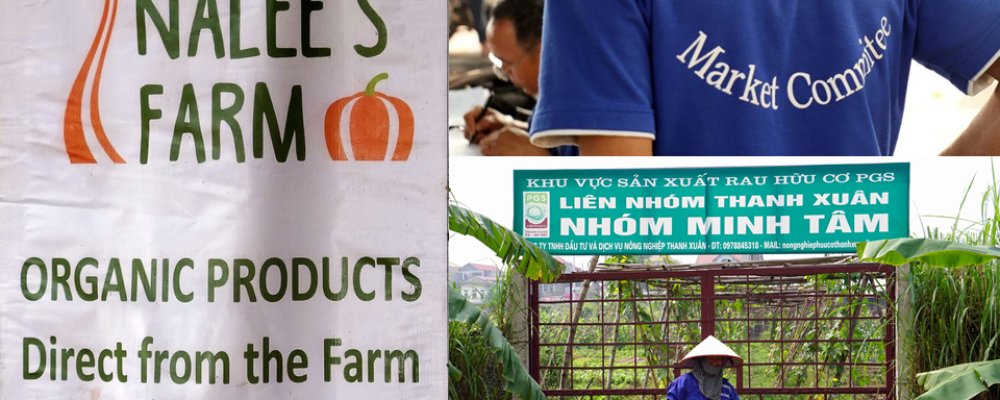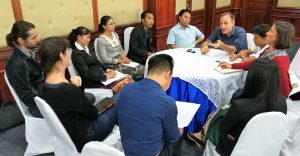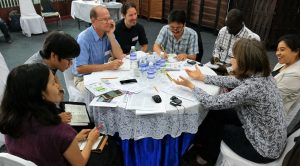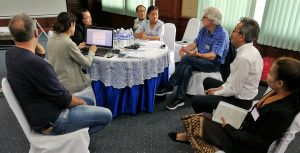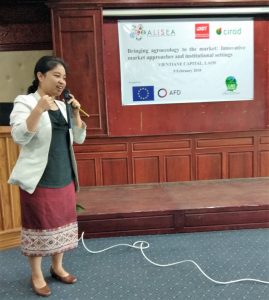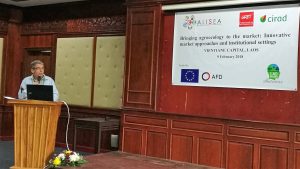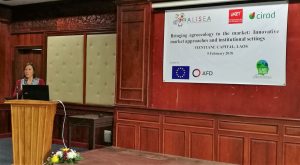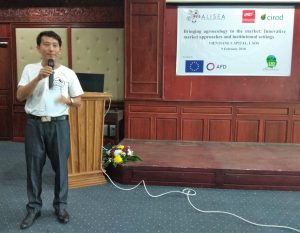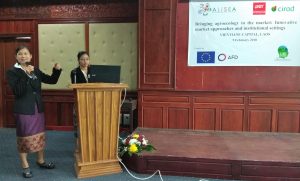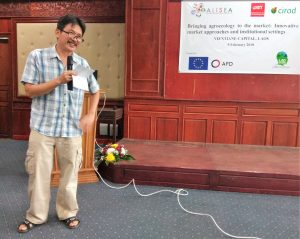On the 9th of February, 44 participants from Government agencies, Research Institutes, National University of Laos, Development practitioners and private sector gathered at the Vansana Riverside Hotel in Vientiane, Laos for a thematic workshop on Bringing Agroecology to the Market: Innovative Market Approaches and Institutional Settings to accompany the agroecological transition.
This workshop was organized by ALiSEA with the support from GRET and CIRAD. It took place in the framework of the Lao Uplands Initiative.
A very popular term throughout the world, agroecology designates at the same time a scientific discipline, a set of agricultural practices, and a political/social movement (Wezel et al, 2009). The rallying point of these approaches is the need to improve the sustainability of agriculture, by focusing on various dimensions (e.g., agronomic, environmental, social, economic, and ethical) and at various scales (e.g., the plot/field, the farm, the landscape and the whole food system). Agroecology is thus not only about transforming agricultural practices, it is also about transforming the relationship between agriculture and the society. As a result, it also focuses on social values, such as trustworthiness, health, food sovereignty, youth development and improved livelihoods for farmers and their communities (Loconto et al., 2016).
The agroecological transition may therefore be understood as an innovation that involves changes occurring well beyond the field/farm level, as new rules, roles and forms of interactions are created. We will focus here on these other innovations and especially on the role played by markets (and new types of exchange) as incentives for the adoption of agroecological/sustainable agricultural practices. This will lead us to explore the new links established between farmers for whom economic benefits appear as a key driver of the adoption of innovative practices such as agroecology (Castella & Kibler, 2015) and consumers, who act as crucial drivers in these new initiatives.
As the adoption of innovations involves a complex learning process, new ways of thinking and a considerable amount of risk taking, it is important to identify ways to provide visibility and to reward efforts made by farmers and other stakeholders in building agroecological alternatives to conventional food and agriculture systems. Alternative food networks and new relations between committed consumers and farmers illustrate this new way of doing things that extends throughout the value chain.
It is important to emphasize here that products are not the only goods being valued in this process: cultural traditions, ideas, visions and knowledge are also being exchanged. In this sense, agroecology represents an alternative economic model whereby producers and consumers jointly define the quality of products by taking into account other innovative components such as farmers’ employment, food sovereignty, and biodiversity (Stassart et al., 2012). Ultimately, it is the very nature of markets that is at stake, with a possibility to shift to what some call “mindful markets” (Van Willenswaard et al., 2015), i.e. markets that are inclusive and compassionate, based on full awareness of whole food systems. This means taking into account healthy food self-reliance for farmers, farmers’ families and rural communities, based on long term trusteeship and care for the land and landscapes.
This thematic workshop aimed at addressing the following questions:
- What types of institutional innovations are taking place in the Lao PDR to accompany the agroecological transition?
- How do these innovations challenge existing market relations?
- How can the ecological transition be best accompanied?
- Can these initiatives be scaled up or are they likely to remain islands of innovation in an ocean of conventional farming and market practices?
The workshop was articulated around 3 main sessions for which all presentations can be download hereafter:
Setting the stage: Introduction of some key concepts (Agroecology, Markets, Trust, Mindful Markets)
- Agroecology & Markets: Setting the scene, by Dr Isabelle Vagneron, CIRAD
- Towards Organic Asia and Mindful Markets, by Chanthalangsy Sisouvanh, RDA
Getting inspired: Presentation of some innovations in Laos and Thailand:
- Inspiring examples from Thailand, by Vitoon Panyakul, GreenNet
- Panyanivej Organic Farm, Laos, by Ms. Somchit Phankhamt,
- Starting the agroecological transition among Hmong farmers in Nong Het, Xieng Khouang, by Mr Laut Lee, Xao Ban group
- The development of the PGS Stakeholder Group in Huaphanh, Laos, by Dominique Van Der Borght, GRET
- Farmers’ basket initiative from Ban Thongmang organic farmers’ group, by Ms. Kingkeo Souphanthong, group leader
Working together: World café session organized around 3 main questions
- How to build/restore trust between consumers & other stakeholders of the food system (producers, collectors/middlemen, traders, retailers)?
- How to raise awareness of all stakeholders involved in the food system & foster learning alliances from producers to consumers?
- What institutional, organizational and technical innovations to support the emergence of markets for agroecological products?
The proceedings of all the discussions will be produced soon and made available here. This will help drafting a learning brief that will feed the Lao Uplands Conference in Luang Prabang on 12-14 March 2018.
- Working group
- Working group
- Working group
- Ms Chantalangsy, RDA
- Mr Dominique Van Der Borght
- Ms Isabelle Vagneron
- Mr Laut Lee, Xao Ban
- Ms Kingkeo
- Ms Somchit
- Mr Vitoon, Green Net

